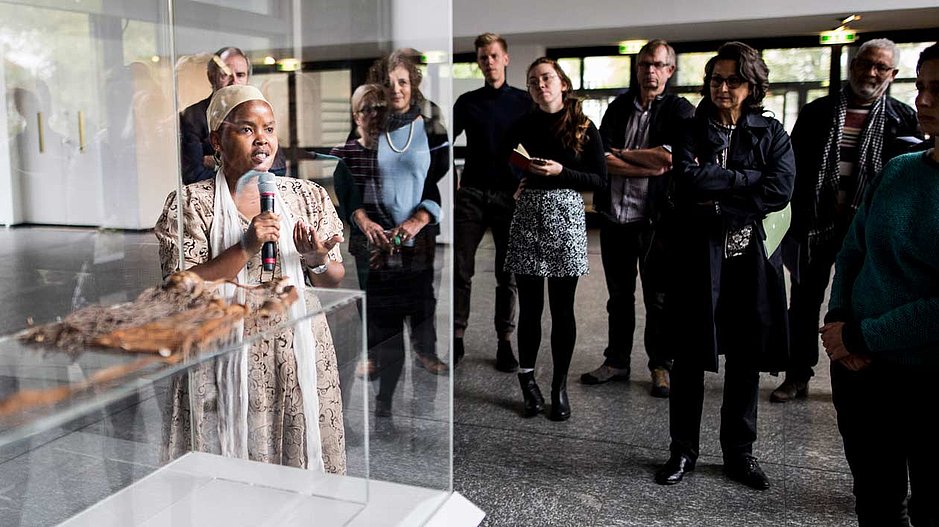Bereichsnavigation
Managing Non-European Objects
To ensure that non-European objects and their history are managed properly, the SPK has developed a general policy in the course of the preparations for the Humboldt Forum. The inclusion of the societies of origin is a central part of it.
A New View of Non-European Objects
The non-European collections of the Staatliche Museen zu Berlin (National Museums in Berlin) have been assembled over several generations. They have their origins in the Kunstkammer (Cabinet of Art and Curiosities), but the majority of the objects were acquired in the second half of the nineteenth century. The aim of the museums was to document and study societies outside Europe.
People's opinion of these collections has changed significantly since their creation. Nowadays, they remain an important source of material for research and they still provide the general public with information about different regions of the world. The management of non-European objects and their presentation in museums has, however, changed fundamentally in the meantime. Human remains and objects from colonial contexts, in particular, need to be treated with great sensitivity. Accordingly, the SPK has developed its own general policies for both categories.
General Framework for Museums
The appropriate way of managing non-European objects in Western museums today has been the subject of intense discussion for several years. One important basis for this is ICOM's Code of Ethics for Museums, issued in 2013. In addition, the Stiftung Preussischer Kulturbesitz (Prussian Cultural Heritage Foundation) has formulated its own general policy on the subject in the course of preparing its new presentation of the non-European collections in the Humboldt Forum.
In 2018, the Deutscher Museumsbund (German Museums Association) issued its initial draft guidelines for managing items from colonial contexts in collections. Later in the same year, the “Sarr Savoy report” was presented in France. In 2019, representatives of Germany's national and state governments, as well as local umbrella organizations, agreed the cornerstones for managing objects from colonial contexts in collections. Each of these documents addresses the issues of the origin of objects, dialogue with the societies of origin from which they come, and the options available for managing them. People in many other countries are also trying to draw up appropriate approaches for managing ethnological or indigenous objects. For example, the Nationaal Museum van Wereldculturen in the Netherlands published its principles for this area in 2019.
Provenance Research into Non-European Objects
In order to manage such objects appropriately, it is essential to know their origin and the history of their acquisition. Pieces may come from any part of the world and may have been acquired in any number of different ways, in various historical and social circumstances.
Consequently, the Ethnologisches Museum (Ethnological Museum) and the Museum für Asiatische Kunst (Asian Art Museum), like all of the foundation's other institutions, are researching the provenance of the objects in their collections. Subcollections with a particularly critical history, such as those from former German colonial territories, are researched as a priority. Nowadays, it would be inconceivable to undertake such research without involving representatives of the societies of origin and experts from the corresponding countries. Mutual respect and multilateral exchange on an equal footing form the basis of any cooperative venture.
In addition to the records on file, traditional forms of handing down knowledge, such as oral narrative, are taken into account. The results are made available in publications, exhibitions, and online. In certain cases, returning objects may be considered.
Dialogue with Societies of Origin: Shared Heritage
Dialogue with representatives of the societies of origin of non-European objects forms an important part of the museum's work, and it is not limited to the context of provenance research. The idea is that their knowledge should flow into the work being done on certain objects and make it possible to appraise and present them from multiple perspectives. In addition, consideration is to be given to demands made by the societies of origin regarding the appropriate management of the objects. The SPK aims to maintain an open-ended dialogue in which it is possible to discuss ways of continuing to permit the scientific study of the objects and of keeping them accessible for the general public.
Documents for Downloading
Further Basic Documents in Germany
Selection of International Papers
- Felwine Sarr / Bénédicte Savoy: Rapport sur la restitution du patrimoine culturel africain. Vers une nouvelle éthique relationnelle
- Nationaal Museum van Wereldculturen (NL): Return of Cultural Objects: Principles and Process
- NAGPRA Program (USA)


